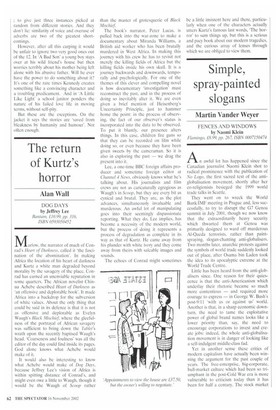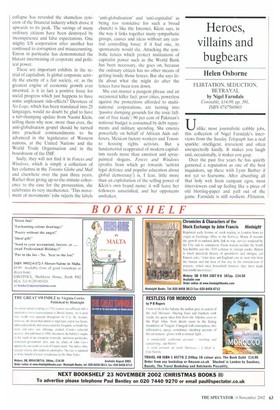Simple, spray-painted slogans
Martin Vander Weyer
FENCES AND WINDOWS by Naomi Klein
Flamingo. £8.99, pp. 267, ISBN 0007150474
An awful lot has happened since the Canadian journalist Naomi Klein shot to radical prominence with the publication of No Logo, the first sacred text of the antiglobalisation movement, shortly after her co-religionists besieged the 1999 world trade talks in Seattle.
They went on to wreck the World Bank/IMF meeting in Prague and, less successfully, to try to disrupt the G7 Genoa summit in July 2001, though we now know that the extraordinarily heavy security which thwarted them at Genoa was primarily designed to ward off murderous Al-Qaeda terrorists, rather than paintspraying, slogan-chanting anti-globalisers. Two months later, anarchic protests against the symbols of world trade suddenly looked out of place, after Osama bin Laden took the idea to its apocalyptic extreme at the World Trade Centre.
Little has been heard from the anti-globalisers since. One reason for their quiescence is that the anti-Americanism which underlay their rhetoric became so much more contentious — and required more courage to express — in George W. Bush's post-9/11 'with us or against us' world. Another is that, in a sharp economic downturn, the need to tame the exploitative power of global brand names looks like a lower priority than, say, the need to encourage corporations to invest and create jobs: indeed, the whole anti-globalisation movement is in danger of looking like a self-indulgent middle-class fad.
Yet in another sense these critics of modern capitalism have actually been winning the argument for the past couple of years. The free-enterprise, big-corporate, bull-market culture which had been so triumphant in the post-Cold War era is more vulnerable to criticism today than it has been for half a century. The stock market collapse has revealed the shameless cynicism of the financial industry which drove it upwards to its peak. The savings of many ordinary citizens have been destroyed by incompetence and false expectations. One mighty US corporation after another has confessed to corruption and misaccounting. Enron in particular has demonstrated the blatant intertwining of corporate and political power.
These are important exhibits in the retrial of capitalism. Is global corporate activity the enemy of a fair society, or, as the greatest engine of economic growth ever invented, is it in fact a positive force for social progress which just happens to have some unpleasant side-effects? Devotees of No Logo, which has been translated into 25 languages, would no doubt be glad to have a tub-thumping update from Naomi Klein. telling them why now, more than ever, the anti-globalisation gospel should be turned into practical commandments to be advanced in the legislatures of Western nations, at the United Nations and the World Trade Organisation and in the boardroom of the IMF.
Sadly. they will not find it in Fences and Windows, which is simply a collection of her columns in the Toronto Globe and Mail and elsewhere over the past three years. Rather than giving up-to-the-minute coherence to the case for the prosecution, she celebrates its very incoherence. This movement of movements' (she rejects the labels 'anti-globalisation' and 'anti-capitalist' as being too restrictive for such a broad church) is like the Internet, Klein says, in the way it links together many sympathetic groups, causes and ideas without any central controlling force: if it had one, its spontaneity would die. Attacking the symbolic fences which protect institutions of capitalist power such as the World Bank has been necessary, she goes on, because the ordinary citizen has no other means of getting inside those fences. But she says little about what she might do after the fences have been torn down.
She can muster a pungent phrase and an occasional killer fact: poor cities, powerless against the protections afforded to multinational corporations, are turning into 'passive dumping grounds for the toxic fallout of free trade': 90 per cent of Pakistan's national budget is consumed by debt repayments and military spending. She emotes powerfully on behalf of African Aids sufferers, Mexican factory workers and Toronto housing rights activists. But a fundamental reappraisal of modern capitalism needs more than emotion and spraypainted slogans. Fences and Windows (profits from which go towards 'activist legal defence and popular education about global democracy') is, I fear, little more than an exploitation of the selling power of Klein's own brand name: it will leave her followers unsatisfied, and her opponents unshaken.



























































































 Previous page
Previous page